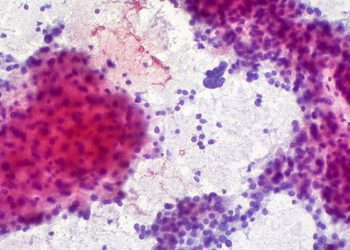Camrelizumab with apatinib is a well-tolerated treatment for chemo-refractory or relapsed gestational trophoblastic neoplasia
1. Camrelizumab and apatinib treatment provided a 55% objective response rate
2. A complete response was observed in 50% of patients and none relapsed after discontinuing treatment
Evidence Rating Level: 2 (Good)
Study Rundown: Gestational trophoblastic neoplasia (GTN) is rare and can be categorized as high- or low-risk. Though the majority of high-risk patients recover after primary chemotherapy treatment, 5% relapse, or develop a refractory disease. The combination of a programmed cell-death 1 (PD-1) protein inhibitor (e.g., camrelizumab) with a vascular endothelial growth factor (VEGF) inhibitor (e.g. apatinib) has shown previous enhanced anti-tumour activity. This single arm, phase 2 trial explored the impact of this combination treatment on objective response rate, progression-free survival (PFS), overall survival (OS), and safety in patients with chemo-refractory GTN. Just over half (55%) of patients had an objective response, as measured by reduced serum hCG concentration. Median PFS was 9.5 months, and OS for 6 and 12 months was 100% and 90%, respectively. Safety was determined by the reported adverse effects secondary to treatment with camrelizumab and apatinib. Hypertension was the most common severe adverse effect associated with treatment, while rash was the most common immune-related adverse effect. Only one patient had a serious adverse event (elevation of aspartate aminotransferase) resulting in hospitalization. Limitations to this study include the small sample size and an inability to analyze for predictive biomarkers (e.g., PD-L1) due to inadequate tumour samples. Overall, the combination of camrelizumab and apatinib is a tolerable treatment option for high-risk, chemo-refractory, gestational trophoblastic neoplasia.
Click to read the study in The Lancet Oncology
Click to read an accompanying editorial in The Lancet Oncology
In-Depth [prospective cohort]: This single arm, prospective phase 2 study of 20 eligible patients with high-risk, chemo-refractory gestational trophoblastic neoplasia (GTN) investigated the outcomes of treatment with camrelizumab and apatinib on objective response, progression-free survival (PFS), overall survival (OS), and safety. Of the 20 patients, 1 had placental site trophoblastic tumour and 19 had choriocarcinoma. Eligibility requirements included adult women with chemo-refractory or relapsed GTN who had previously received two or more multidrug chemotherapy cycles and had a life expectancy of 4+ months. Treatment cycles were 4 weeks long and, in addition to a daily oral dose of 250mg of apatinib, every 2 weeks patients received 200mg of camrelizumab intravenously. Discontinuation of treatment occurred upon withdrawal of consent, unacceptable toxic effects, or progression of disease. Response to treatment was assessed via measurements of serum hCG concentration. Fifty-five percent (95% confidence interval (CI), 32-77%) of all patients had an objective response to the treatment; while 53% (CI, 29-76%) of the 19 choriocarcinoma patients did. Of the 50% (CI, 27-73%) of all patients who had a complete hCG concentration normalization, none had a relapse upon discontinuation of treatment. A median of 3 treatment cycles was required to obtain a complete response (interquartile range (IQR) 1.5-5.8 cycles). Median PFS was 9.5 months, but the 95% confidence interval was not reached. Post-hoc analysis showed a 100% (95% CI, 100-100) and 90% (95% CI, 66-97) survival at 6 and 12 months, respectively. Adverse effects of any severity were noted in 90% of patients, while grade 3 severity effects were recorded in 60%, most commonly hypertension (25%) followed by rash (20%). Grade 3 neutropenia, leukocytopenia, and an increase in aspartate aminotransferase were each reported in 10% of patients. While dose reductions were permitted for apatinib due to adverse events, the dosing of camrelizumab remained the same. A total of 25% of patients received a reduced dose of apatinib secondary to grade 3 hypertension. Only 1 patient (5%) developed unmanageable hypertension and stopped apatinib. Hospitalization secondary to grade 3 increased aspartate aminotransferase occurred in 1 patient (5%) and required discontinuation of the combination treatment regimen. In addition to treatment-related adverse events, immune-related events were reported in 50% of all patients. Half of these patients had rash, and the other half had reactive cutaneous capillary endothelial proliferation (RCCEP). Grade 3 immune events were noted in 5 patients (25%), with 3 having rash and 2 having neutropenia. Corticosteroid was effective in treating the immune rash, and administration of granulocyte colony-stimulating factor alleviated the neutropenia.
Image: PD
©2021 2 Minute Medicine, Inc. All rights reserved. No works may be reproduced without expressed written consent from 2 Minute Medicine, Inc. Inquire about licensing here. No article should be construed as medical advice and is not intended as such by the authors or by 2 Minute Medicine, Inc.


![2 Minute Medicine: Pharma Roundup: Price Hikes, Breakthrough Approvals, Legal Showdowns, Biotech Expansion, and Europe’s Pricing Debate [May 12nd, 2025]](https://www.2minutemedicine.com/wp-content/uploads/2025/05/ChatGPT-Image-May-12-2025-at-10_22_23-AM-350x250.png)




